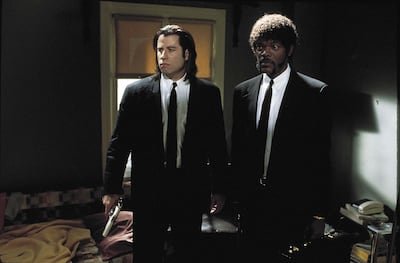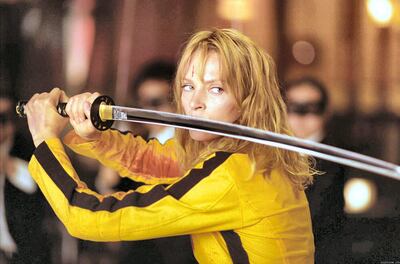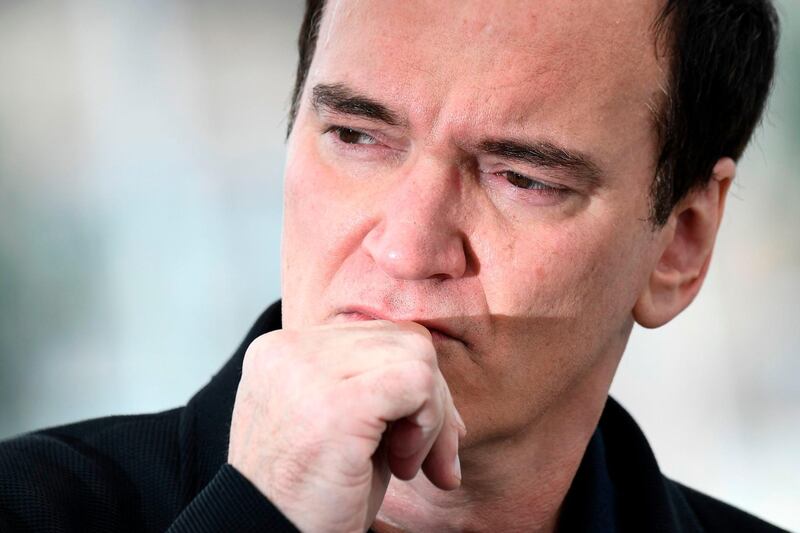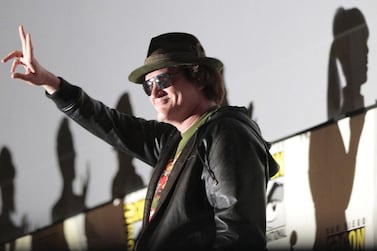Quentin Tarantino's ninth movie, Once Upon a Time... In Hollywood, wowed the super-secret crowd of journalists at the Cannes Film Festival last week. As this is apparently his penultimate film (he's always said he'd make only 10, then retire), it's time we reflected on why he's one of the best and most original directors of our generation.
1. The kid in the dream
Once upon a time, in Hollywood as it happens, Quentin Tarantino told me about a recurring dream that had been keeping him awake most nights. The dream, he recalled, was of a kid. Then, he corrected himself. "No, the dream is of a very cool kid. And whatever I do, I can't let him down.
“When he grows up, this kid will be a fan of mine, and I want that when he discovers my films, there won’t be a weak link among them.”
Tarantino, it's clear, is not a man who struggles with a lack of ego. But he is also one who has consistently counterbalanced that with a genuinely unmatched quality in his body of work. From Reservoir Dogs to Pulp Fiction and his ninth and latest movie, the director has crossed several genres but maintained a singular brilliance. With his penultimate film this month wowing Cannes, the kid, you'd imagine, is happy so far.

2. The video-store education
It's the stuff of legend that Tarantino learnt his trade working in a Los Angeles video store, spending his downtime absorbing every tape on the shelf. That's where he discovered his love for Hong Kong crime flicks (that he riffed on with Reservoir Dogs), the French New Wave (Pulp Fiction), Blaxploitation (Jackie Brown), the Shaw Brothers' wuxia films (Kill Bill), grindhouse (Death Proof), men-on-a-mission movies (Inglourious Basterds), southern plantation dramas (Django Unchained), westerns (The Hateful Eight) and, well, the work of Kurt Russell (Tarantino has cast him in his last three movies).
As the director says: “I steal from every movie ever made … Great artists steal – they don’t do homages.”
3. The recurring motifs
Non-linear narratives, blistering bursts of violence, kinetic tracking shots, pop-culture references, close-ups of feet, famous dance sequences, director cameos and fictional brands like Big Kahuna Burgers and Red Apple cigarettes: Tarantino movies are all individual tapestries, but they share many common threads.
Once Upon A Time even makes reference to another Vega brother, a relation to John Travolta's Vincent from Pulp Fiction and Michael Madsen's Vic – aka Mr Blonde – from Reservoir Dogs. As his long-time producer Lawrence Bender once described this one-man universe: "When you buy a ticket to one of Quentin's movies, you're basically buying a one-way ticket to Tarantino-land."
4. The career resurrections
In early 1994, John Travolta's once-illustrious career had become limited to the Look Who's Talking series. Bruce Willis was hardly doing much better – he was reduced to voicing the actual baby in them, after the high-profile catastrophes of Bonfire of the Vanities and Hudson Hawk. Then, Pulp Fiction happened.
Travolta and Willis aren't the only ones who owe that nice new swimming pool to Tarantino, either. His canny casting of stars whose own careers had long since faded has also included Pam Grier and David Carradine. Tragically, Tarantino had just done the same for Luke Perry, in Once Upon A Time – a movie that will sadly now be the late Perry's last.
5. The at-home music store
A few years ago, I was lucky enough to go to Tarantino's house to present him with an award. He has a massive room that he's converted into his own "record store", where he can thumb through rare albums to find the songs he wants for whatever movie he's working on. Little wonder his incredible soundtracks have defined his career as much as his visuals have, from the opening bars of George Baker Selection's Little Green Bag that played over Reservoir Dogs's credit sequence to the "whistling song" in Kill Bill (which was taken from 1969 British horror film, Twisted Nerve).
6. The partnerships that lasted (and the one that didn’t)
Before the on-set crash in Mexico on Kill Bill: Vol 2, which left Uma Thurman with permanent damage to her neck and knees, she wasn't only Tarantino's muse, but one of his closest collaborators – her role as The Bride, for instance, was credited as being a creation "of Q & U". Tarantino has always surrounded himself with an inner circle of quality character actors who he has repaid with gold-dust parts. The current leader is Samuel L Jackson, who has now worked with Tarantino six times – and was famously robbed of the Best Actor Oscar for his role as Jules Winnfield in Pulp Fiction by no less than Forrest Gump.

Four-time QT veteran, Michael Madsen, meanwhile, claims that "working with Quentin is my favourite thing". Although, given that he has routinely starred in films with names like Piranhaconda and CobraGator, you'd hope that was the case.
7. The way with words
Tarantino has won two Oscars for screenwriting (Pulp Fiction, Django Unchained), but his work isn't limited to awards-friendly fare. His story for the provocative Natural Born Killers and his beloved screenplay for True Romance are only two highlights. And the man who has redefined both modern movie dialogue and structure also claims he now has an idea for a Star Trek movie, which he may also direct. Can Klingon finally become cool?
8. The outlandish gore
The infamous "ear-slice" sequence in his debut led to Reservoir Dogs being banned on VHS for nearly three years in the UK, despite the fact you never actually see the ear come off. And, ever since, Tarantino films have not exactly lacked in guts. Today, the director is tired of defending the violence in his movies. But when I last met him, to talk about the House of Blue Leaves sequence in Kill Bill: Vol 1, in which Uma Thurman's The Bride hacks her way through no less than 88 ill-fated opponents, he was much more direct: "Sure, it's violent," he said. "But it's a Tarantino movie. I mean, you don't go to a Metallica concert and ask them to turn the music down."
9. The changing of history
What happens in Cannes stays in Cannes. That was the mantra of the journalists who got the first look at Once Upon a Time... In Hollywood, and kept its secrets safe. Word on the Croisette was that the movie – a Pulp Fiction-style, multi-stranded narrative – features a final act so daring it puts the events of Inglourious Basterds in the shade. Given that that movie saw Tarantino rewrite history by having American soldiers kill Hitler, and that this one is based loosely around the Manson Family murders of actress Sharon Tate and four others at the home she shared with her husband Roman Polanski (who was shooting a movie in Europe), one can only imagine what he's cooked up this time.
Nine movies in, and Tarantino is still No 1 with a bullet.






